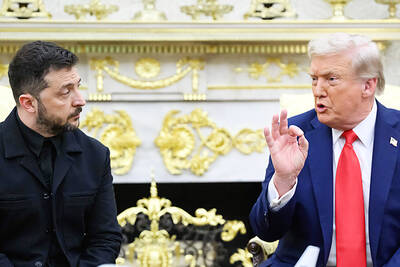A heavily guarded convoy of six buses snaked its way out of Nepal's capital yesterday, the first vehicles to defy Maoist rebels who blockaded Kathmandu this week with threats alone and without setting up a single roadblock.
But the risk of attacks by the insurgents kept other vehicles off the roads, and police said no cars or delivery trucks have entered the capital since Wednesday's start of the blockade, called by the rebels to demand that the government release jailed comrades.
The blockade has left the capital with only a few days' worth of fresh produce and cooking fuel, officials have said.
However, the city has enough food staples such as rice and flour to last about a month, commerce ministry official Dinesh Pyakurel said.
Even with dozens of soldiers in trucks guarding the convoy of six buses, many would-be travelers were too scared to use them and only about 50 passengers headed off for various destinations in Nepal's southwest.
In the past, rebels have burned dozens of vehicles and planted mines to reinforce blockades, and early this week they threw a bomb at a luxury hotel for disregarding an order to shut down. "We have doubled the number of patrols and mobilized troops all over the highway. Security forces are on high alert all across the nation," Home Ministry official Anantraj Pandey said.
Army officials said they have offered to escort supply trucks to bring food into the city, but truck owners have refused to work.
People in Kathmandu were mostly calm and store owners reported no panic buying. Many civilians said they expected the rebels to drop the blockade after a few days.
The rebels -- inspired by Chinese leader Mao Zedong (毛澤東) -- have been fighting since 1996 to replace Nepal's monarchy with a communist state. More than 9,500 people have died in the war, most of them in rural areas far from the capital.
The guerrillas have struck Kathmandu before, planting bombs under buses and motorcycles to enforce strikes or inspiring students to shut down schools. But this week's blockade was unusual because it was succeeding simply on fear.
There were no reports of rebels setting up barricades on any roads, and police officers said they had seen no guerrillas. But the insurgents were believed to be watching the roads, which were empty except for military and police vehicles.
Other than planes, which are too expensive for most in this impoverished nation, roads are the only way to travel in the Kathmandu Valley, and its 1.5 million people depend on trucks to bring fuel, food and other goods.
The rebels sent a notice to newspapers last week saying that beginning Wednesday they would impose the blockade for an indefinite period to pressure the government to free jailed guerrillas and provide information on others who are missing. They threatened to attack any vehicles traveling on the highways.
Prime Minister Sher Bahadur Deuba's government has made no public comment on the demands.
Authorities refuse to say how many rebels are being detained. Nepalese law allows soldiers to detain people suspected of being rebels for 90 days without charge.

Shamans in Peru on Monday gathered for an annual New Year’s ritual where they made predictions for the year to come, including illness for US President Donald Trump and the downfall of Venezuelan President Nicolas Maduro. “The United States should prepare itself because Donald Trump will fall seriously ill,” Juan de Dios Garcia proclaimed as he gathered with other shamans on a beach in southern Lima, dressed in traditional Andean ponchos and headdresses, and sprinkling flowers on the sand. The shamans carried large posters of world leaders, over which they crossed swords and burned incense, some of which they stomped on. In this

Near the entrance to the Panama Canal, a monument to China’s contributions to the interoceanic waterway was torn down on Saturday night by order of local authorities. The move comes as US President Donald Trump has made threats in the past few months to retake control of the canal, claiming Beijing has too much influence in its operations. In a surprising move that has been criticized by leaders in Panama and China, the mayor’s office of the locality of Arraijan ordered the demolition of the monument built in 2004 to symbolize friendship between the countries. The mayor’s office said in

‘TRUMP’S LONG GAME’: Minnesota Governor Tim Walz said that while fraud was a serious issue, the US president was politicizing it to defund programs for Minnesotans US President Donald Trump’s administration on Tuesday said it was auditing immigration cases involving US citizens of Somalian origin to detect fraud that could lead to denaturalization, or revocation of citizenship, while also announcing a freeze of childcare funds to Minnesota and demanding an audit of some daycare centers. “Under US law, if an individual procures citizenship on a fraudulent basis, that is grounds for denaturalization,” US Department of Homeland Security Assistant Secretary Tricia McLaughlin said in a statement. Denaturalization cases are rare and can take years. About 11 cases were pursued per year between 1990 and 2017, the Immigrant Legal Resource

‘RADICALLY DIFFERENT’: The Kremlin said no accord would be reached if the new deal with Kyiv’s input did not remain within the limits fixed by the US and Russia in August Ukrainian President Volodymyr Zelenskiy is to meet US President Donald Trump in Florida this weekend, but Russia on Friday accused him and his EU backers of seeking to “torpedo” a US-brokered plan to stop the fighting. Today’s meeting to discuss new peace proposals comes amidst Trump’s intensified efforts to broker an agreement on Europe’s worst conflict since World War II. The latest plan is a 20-point proposal that would freeze the war on its current front line, but open the door for Ukraine to pull back troops from the east, where demilitarized buffer zones could be created, according to details revealed by